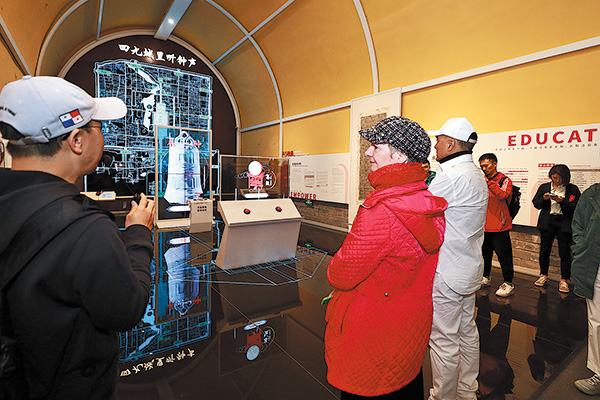

Speaking from his own experience, Heimowitz says China was very different when he first came to the country more than 40 years ago.
"If you think about how China is today, it has a global leadership role, and it's very international. That's very different from when I first came," he says.
He thinks China-US relations are very important and that's one of the reasons he visited this time.
"We have to do a better job, and the only way to do that is to reduce fear and eliminate ignorance. It's really dependent on people-to-people exchanges," Heimowitz says.
"That means those of us in the cultural sphere have a responsibility to connect people, because when people are connected, they have a chance to interact with each other. They can see for themselves and they can create their own stories and their own narratives, rather than listening to the ones constructed by other people," he adds.
Like Oliver, Heimowitz says his biggest impression of China has also come from the warmth of his Chinese friends.
"When I first came to China as a young boy, it was a really poor country," he recalls, adding that many of his friends here didn't have much, but they were so warm and generous with their spirit and everything they had, which made him always feel welcome.
"I think that's something important for all of us: to nurture and remember the connectivity we can feel at the people-to-people level," he says, adding that it can be used as a springboard to improve relations between the US and China, and help China to be better understood by different cultures and people across the world.
At the final evaluation meeting of the first Orchid Awards, the international judges exchanged ideas on the Global Civilization Initiative.
They proposed that strong relationships between countries depend on the mutual understanding and closeness between their peoples, which in turn depend on the blending of their cultures.
They concurred that different civilizations may have varying interpretations of values and beliefs, but the desire for a better life is universal. By actively embracing the global initiative for civilization, identifying common ground between different cultures, and fostering mutual understanding, a solid foundation can be established for building a community with a shared future for mankind.
After seeing more traditional folk customs and interacting with other Orchid Awards judges during the trip, Ahmed says he will bring his experience in Beijing back to Egypt.
Since 2019, Ahmed has cooperated with the China Cultural Center in Cairo to host "China in the eyes of Egyptians", a monthly cultural salon, which has now become an important platform for various sectors in Egypt, and even the entire Middle East region, to understand and get to know China.
"The development levels of Egypt and China were similar 50 years ago, but today China's developmental achievements are remarkable, and there are many things worth learning from,"Ahmed says.
"I hope that Egypt and China can learn from each other, make progress together, and develop even more."